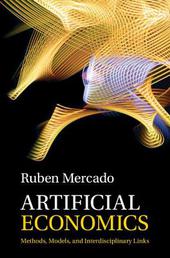
|
Artificial Economics: Methods, Models, and Interdisciplinary Links
Hardback
Main Details
| Title |
Artificial Economics: Methods, Models, and Interdisciplinary Links
|
| Authors and Contributors |
By (author) Ruben Mercado
|
| Physical Properties |
| Format:Hardback | | Pages:196 | | Dimensions(mm): Height 235,Width 158 |
|
| Category/Genre | Econometrics
Artificial intelligence |
|---|
| ISBN/Barcode |
9781316517093
|
| Classifications | Dewey:330.1 |
|---|
| Audience | | Professional & Vocational | | Tertiary Education (US: College) | |
|---|
| Illustrations |
Worked examples or Exercises
|
|
Publishing Details |
| Publisher |
Cambridge University Press
|
| Imprint |
Cambridge University Press
|
| Publication Date |
4 November 2021 |
| Publication Country |
United Kingdom
|
Description
This introductory overview explores the methods, models and interdisciplinary links of artificial economics, a new way of doing economics in which the interactions of artificial economic agents are computationally simulated to study their individual and group behavior patterns. Conceptually and intuitively, and with simple examples, Mercado addresses the differences between the basic assumptions and methods of artificial economics and those of mainstream economics. He goes on to explore various disciplines from which the concepts and methods of artificial economics originate; for example cognitive science, neuroscience, artificial intelligence, evolutionary science and complexity science. Introductory discussions on several controversial issues are offered, such as the application of the concepts of evolution and complexity in economics and the relationship between artificial intelligence and the philosophies of mind. This is one of the first books to fully address artificial economics, emphasizing its interdisciplinary links and presenting in a balanced way its occasionally controversial aspects.
Author Biography
Ruben Mercado is a Professor at the Latin American Faculty of Social Sciences and a member of the editorial board for the journal Computational Economics. He holds a Ph.D. in economics from The University of Texas at Austin. His research specializes in computational economics, economic modeling and economic development. In the past, he has taught at the University of Texas at Austin, Bryn Mawr College, the Technological and Higher Studies Institute of Monterrey, and the Universities of Buenos Aires, Quilmes and San Martin. He has also been a Senior Economist at the United Nations Development Program, a Chair for the Study of Western Hemispheric Trade at the Lozano Long Institute of Latin American Studies, and a consultant for the World Bank and the Inter-American Development Bank. He is a co-author of the pioneering textbook Computational Economics (2006).
Reviews'The use of Artificial Intelligence-driven methods in economics are becoming widespread. Ruben Mercado's book gives, at an entry-level, a nice overview of the various domains where AI is applied in economics. Through its intuitive approach, the book gives a good insight into this new field and is accessible to a broad audience.' Hans Amman, University of Amsterdam 'This book does an outstanding job at fleshing out different approaches to the study of artificial economies. Mercado provides a detailed examination of the philosophical foundations that justify the conflation of artificial and human economies and reveals the wide-ranging connections between the study of complex systems, computer science, and behavioral science. Mercado has the rare ability of being able to speak to attract both the specialist and the uninitiated to the exploration of worlds populated by artificial agents engaged in economic interactions. This alone makes the book worth reading.' Fernando Tohme, Universidad Nacional del Sur, Argentina 'Ruben Mercado's Artificial Economics is a readable, stimulating introduction to the modeling principles and to the main techniques used in this field. The book focuses on intuitive and conceptual aspects, and it is easily accessible to readers independently of their background. It presents the different techniques using selected, distilled examples, and it complements each approach with a discussion of its links to other disciplines in the social sciences that approach the same problems from different perspectives.' Segismundo Izquierdo, Universidad de Valladolid
|